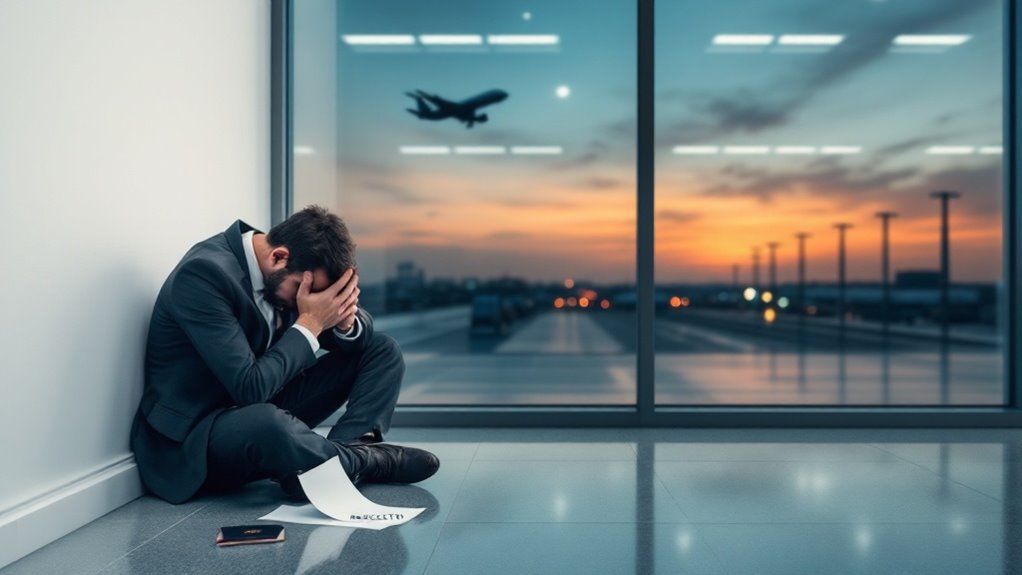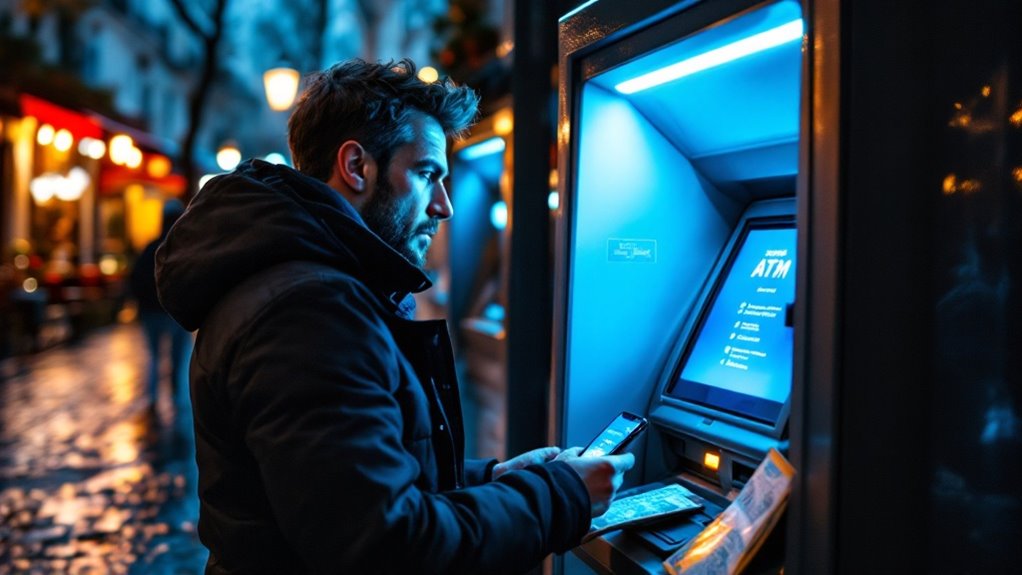Physical Address
304 North Cardinal St.
Dorchester Center, MA 02124
Physical Address
304 North Cardinal St.
Dorchester Center, MA 02124

Common travel mistakes can derail your adventure, but they're easy to avoid with proper planning. Don't wait until the last minute to check visa requirements, notify your bank of travel plans, or book attraction tickets. Skip airport currency exchanges, avoid overpacking "just in case" items, and don't rely solely on credit cards. Download offline maps and essential apps, choose accommodations beyond tourist districts, and allow adequate connection times between flights. These practical steps will transform your journey from stressful to seamless.

When it comes to international travel, one of the most costly mistakes you'll want to avoid is procrastinating on visa requirements. Last-minute visa applications can lead to devastating consequences, including denied entry, financial losses from non-refundable bookings, and potential deportation.
You'll also risk damaging your visa record, which could affect future travel opportunities. To protect yourself, start your visa application process early, as processing times can range from days to months depending on your destination. The Smart Traveller website offers comprehensive guidance for Australian travelers regarding country-specific visa requirements.
You'll want to carefully review embassy checklists, gather all required documents, and double-check your application for accuracy. Common errors like incomplete forms and insufficient documentation account for over 40% of visa denials, but you can easily avoid these pitfalls by giving yourself enough time to prepare properly.
Although packing light seems logical, many travelers succumb to the "just in case" mentality that leads to overstuffed suitcases and unnecessary stress.
Smart travelers know: Packing light isn't just logical—it's liberating. The "just in case" mindset only weighs you down.
Studies show that 40% of travelers return with unworn clothing, while 72% pack excessive comfort items for hypothetical scenarios that rarely materialize.
You'll save time, money, and hassle by planning smarter. Create a packing list 3-4 days before your trip, which can reduce overpacking by 50%. Data indicates last-minute packers account for 29% of Americans who start packing just one day before departure.
Consider building a capsule wardrobe with wrinkle-resistant fabrics, as this approach cuts down items by 30% while maintaining outfit variety.
If you're concerned about weight, invest in a digital luggage scale—they prevent 92% of overweight baggage incidents.

Packing smart saves you hassle at the airport, but your perfectly organized suitcase won't help if your cards get declined abroad. Most U.S. banks require travel notifications to prevent their fraud detection systems from automatically freezing your accounts when they spot overseas transactions.
Before departure, contact your bank through their mobile app, online portal, or phone to provide your exact travel dates and all destination countries, including layover locations. Having multiple copies of your important bank documents stored separately can provide crucial backup if anything goes wrong during your trip.
While some banks like Capital One have eliminated mandatory notifications, others maintain strict requirements, especially for debit cards. If you skip this step, you might face immediate card declines, account freezes, and complicated international calls to restore access.
It's also wise to bring a backup payment method and keep your bank's international contact number handy.
Many travelers underestimate the critical importance of connection times when booking multi-leg flights, leading to stressful sprints through terminals and missed connections.
Rushing between gates with luggage in tow is a preventable travel nightmare that starts with poor connection planning.
When planning your itinerary, you'll need to take into account airport-specific Minimum Connection Times (MCT), which vary greatly between locations and flight types. For domestic transfers, you'll want at least 30 minutes, while international connections typically require 60 minutes or more, especially at major hubs like Heathrow where terminal changes can take up to 90 minutes. Understanding MCTs is essential for passenger satisfaction and comfort.
Don't forget to factor in seasonal delays, customs clearance, and baggage handling times.
It's smart to book all flights on a single ticket, as airlines won't protect self-connected itineraries if you miss a connection, leaving you responsible for rebooking costs.

Despite being convenient, airport currency exchanges rank among the most expensive ways to obtain foreign money, with markups often reaching 5-15% above mid-market rates.
You'll encounter hidden fees, unfavorable exchange rates, and limited currency availability that can force multiple transactions at higher cumulative costs.
Instead of waiting until you're at the airport, you'll save considerably by planning ahead.
Visiting foreign bank branches tends to offer significantly better exchange deals than tourist-heavy locations.
Consider using online services like Wise that offer near-mid-market rates with minimal fees, or visit your local bank where you'll discover better rates than airports.
If you're traveling abroad, look into multi-currency cards that let you lock in rates before your trip, or use fee-free ATM cards that provide local currency at competitive rates.
Smart money management during travel extends beyond finding favorable currency rates to protecting your investment through proper insurance.
You're taking a significant risk by joining the 38% of global travelers who skip travel insurance, especially when medical emergencies abroad can cost thousands and flight cancellations average $387.24.
Skipping travel insurance puts you among the 38% of travelers gambling with potential medical bills and costly flight disruptions.
Don't assume your credit card coverage is enough – 70% of young travelers make this mistake.
With over 1.3 million flights delayed in 2024 alone, protecting your trip has become more crucial than ever.
These small investments in protection can save you from devastating financial losses during your travels.

One of the riskiest travel mistakes is storing all your valuables in a single location, whether it's your checked bag, hotel room, or daypack. If your belongings get lost or stolen, you'll lose everything at once. Instead, distribute your essentials across multiple secure locations.
Keep your passport, extra cash, and important documents in your hotel room safe, while carrying just what you need for the day in a theft-resistant crossbody bag. Most travel insurance providers expect you to exercise reasonable care of belongings when filing theft claims.
When you're out exploring, use inner pockets rather than exterior ones, which are prime targets for pickpockets. Don't leave valuables visible in rental cars, and invest in anti-theft accessories like RFID-blocking wallets and under-clothes pouches.
If you're staying in a hostel, always use lockers with your own padlock for added security.
While protecting your physical valuables is essential during travel, safeguarding your digital security deserves equal attention – particularly when using public Wi-Fi.
Digital security while traveling is just as crucial as watching your wallet – don't let your guard down online.
When you're traveling abroad, it's tempting to connect to any available network, but doing so without protection can expose your sensitive data to cybercriminals.
Using public Wi-Fi without proper security measures puts your passwords, banking details, and personal information at risk of theft. Cybercriminals often create malicious hotspots that appear legitimate to steal data from unsuspecting travelers.

Respecting local customs and dress codes can make or break your travel experience in unfamiliar territories. When you're planning your trip, research the specific dress requirements of your destination, as violations can lead to serious consequences in places like Saudi Arabia and Iran, where modest dress isn't just a suggestion but a legal requirement.
You'll want to pack versatile, neutral-colored clothing that can adapt to different settings, and avoid typical "tourist" items that make you stand out. In many cultures, wearing traditional local attire without understanding its significance can be seen as disrespectful rather than appreciative.
Remember, dressing appropriately isn't just about avoiding trouble – it's about creating meaningful connections. When you respect local norms, you're 40% more likely to have positive interactions with residents, and you'll greatly reduce your risk of unwanted attention or safety issues.
Plus, you'll gain deeper insights into the culture you're visiting.
Beyond dressing appropriately for your destination, where you choose to stay can profoundly shape your travel experience.
While tourist districts offer convenience and familiar comforts, they often isolate you from authentic local culture and come with significant drawbacks. You'll typically pay 20-50% more for meals, face lengthy wait times at attractions, and miss out on genuine cultural experiences that exist beyond these commercial zones. Year-round residents often find that tight-knit communities develop in areas away from tourist hotspots. Having a valid UK visa is essential for exploring beyond typical tourist areas and truly experiencing British culture. Exploring South American destinations requires careful planning to fully experience the continent's diverse cultures and landscapes. The historic East Side Gallery represents one of Berlin's most authentic cultural experiences outside the main tourist areas.

Securing coveted spots at popular attractions requires mastering the art of advance booking windows, which vary dramatically across different destinations and experiences.
You'll need to plan months ahead for major landmarks like the Taj Mahal or Vatican Museums to avoid multi-hour queues, while performing arts and sporting events typically demand bookings 2-6 months in advance.
Don't make the mistake of waiting until the last minute, as you'll face steep markups on the secondary market or risk complete shutouts from must-see attractions.
For national parks like Yellowstone, you'll want to mark your calendar for their 13-month advance reservation window, while seasonal events like Christmas markets often open bookings 6-12 months early.
Recent data shows that younger travelers aged 18-54 are increasingly booking their experiences simultaneously with their transportation and accommodation.
While advance planning guarantees access to top attractions, smart payment strategies can make or break your travel experience.
Don't fall into the trap of relying solely on one credit card, as this can leave you stranded if your card is lost, frozen, or rejected. Foreign transaction fees and poor currency conversion rates can quickly erode your travel budget, while missing out on valuable card benefits like travel insurance and rental car coverage means leaving money on the table. Carefully checking cash prices before redeeming points for travel expenses helps ensure you get the best value from your rewards redemption options.

Modern travelers who rely solely on internet connectivity often find themselves stranded in unfamiliar territory when signals fade or data costs soar. You'll save yourself considerable stress by downloading essential offline tools before your trip.
Start with navigation apps like Maps.me or Google Maps' offline areas, which can reduce your data usage by 80% while traveling. Having reliable travel apps installed before departure can make the difference between a smooth journey and a frustrating experience.
Don't forget to download translation packs from Google Translate or iTranslate Voice for language barriers, and store your itineraries in apps like TripIt or Wanderlog for offline access. Travel apps like XE Currency help you stay informed about current exchange rates without needing constant internet connectivity.
You should also prepare for emergencies by downloading first aid manuals and saving maps with hospital locations. Taking time to research and download transportation schedules can prevent costly travel delays.
For productivity and entertainment, apps like Pocket and Spotify let you download content for offline use, ensuring you're never caught without essential information or entertainment during your journey.
Like a skilled navigator plotting their course before setting sail, you'll now be better equipped to chart your travel journey by avoiding these common pitfalls. Don't let these preventable mistakes become the anchors that weigh down your adventures. Instead, use this knowledge as your compass to guide smoother, more enjoyable trips. When you're prepared, you'll spend less time troubleshooting and more time collecting memorable experiences.